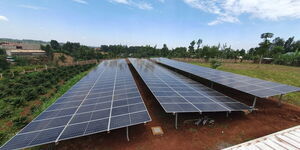Since its inception, the Finance Act 2023 elicited mixed reactions countrywide, prompting President William Ruto to revert to the drawing board to calm dissenting voices.
From threatening lawmakers with dire consequences, summoning them to State House to break down its content, and consolidating opposition leaders' support, Ruto endeavoured to ensure his first Finance Bill passed, and he signed it into law on Monday, June 26.
Ruto received a shot in the arm after the Court of Appeal, on Thursday, July 28, lifted conservatory orders issued against the Finance Act 2023. The government was thus ordered to implement the Act pending the determination of the appeal filed by Treasury CS Njuguna Ndung'u.
Ndung'u opposed a case won by Busia Senator Okiya Omtatah at the High Court, which advocated for the new tax hikes to be nullified.
Among the taxes introduced were the Housing Levy, the digital service tax and a 16 per cent value-added tax (VAT) on petroleum products.
1. Housing Levy
The Housing Levy requires all Kenyan employees to contribute 1.5 per cent of their monthly salary towards a National Housing Development Fund (NHDF).
The Finance Act 2023 outlined that the fund would build affordable housing units for low-income Kenyans, especially those in urban areas. Employers would also contribute an equivalent percentage to aid President William Ruto in securing his legacy.
MPs, prior to the Second Reading, removed the Ksh2,500 cap on the housing levy, enabling the government to deduct 3 per cent from all salaried Kenyans.
2. Export and Investment Promotion Levy
The Export and Investment Promotion Levy (EIPL) would be levied on imports save for goods imported from the East African Community (EAC).
EIPL is intended to promote local manufacturing and investment and generate revenue for the government while offering the country an opportunity to shift from overdependence on imports.
Others include items that are used in the production of exported goods and the construction of affordable housing units.
The EIPL would be levied at a rate of 10 per cent on the customs value of the imported goods.
The EIPL is expected to generate Ksh 10 billion in revenue that would be used to fund the National Housing Development Fund (NHDF) and the Kenya Industrial Transformation Plan (KITP).
However, the Kenya Association of Manufacturers (KMA) rejected the proposed amendment and the introduction of the Export and Investment Promotion Levy.
"Our analysis shows that by imposition of the levy, Kenyan products will be the most expensive in the East African region, which will reverse the trade flow from EAC partners to Kenya.
"Locally, the increase in commodity prices will be passed on to the consumers who are already grappling with the ever-increasing cost of living," KAM warned.
3. 16 Per Cent VAT on Petroleum Products
The Finance Act 2023 doubled the Value Added Tax (VAT) on petroleum products from 8 to 16 per cent.
Kenyans would thus pay more for fuel, which would have a knock-on effect on the cost of transportation, food, and other goods and services.
The government argued that the VAT hike would contribute to an increase in revenue that will fund development projects as the government moves away from overreliance on foreign loans.
4. Expanded PAYE for those earning Ksh800,000 and above
The Finance Act 2023 expanded the Pay As You Earn (PAYE) so that those earning Ksh800,000 and above would pay 35 per cent as Pay As You Earn (PAYE) tax.
This means that Kenyans earning Ksh800,000 and above will pay PAYE on their entire income, an increase from the previous 30 per cent.
The initial expansion was pegged on monthly incomes starting from Ksh500,000, but Members of Parliament reviewed it to Ksh800,000, technically, excluding themselves from the increased PAYE bracket.
5. Increase in Turnover Tax
The Turnover Tax (TOT) is levied on the turnover of businesses in Kenya. TOT is currently set at 1 per cent, but Finance Act 2023 increased it to 3 per cent. This means businesses earning Ksh1 million and above will pay more tax on their turnover.
However, the government lowered the digital service tax from 15 per cent to 3 per cent after content creators opposed the high levy.












